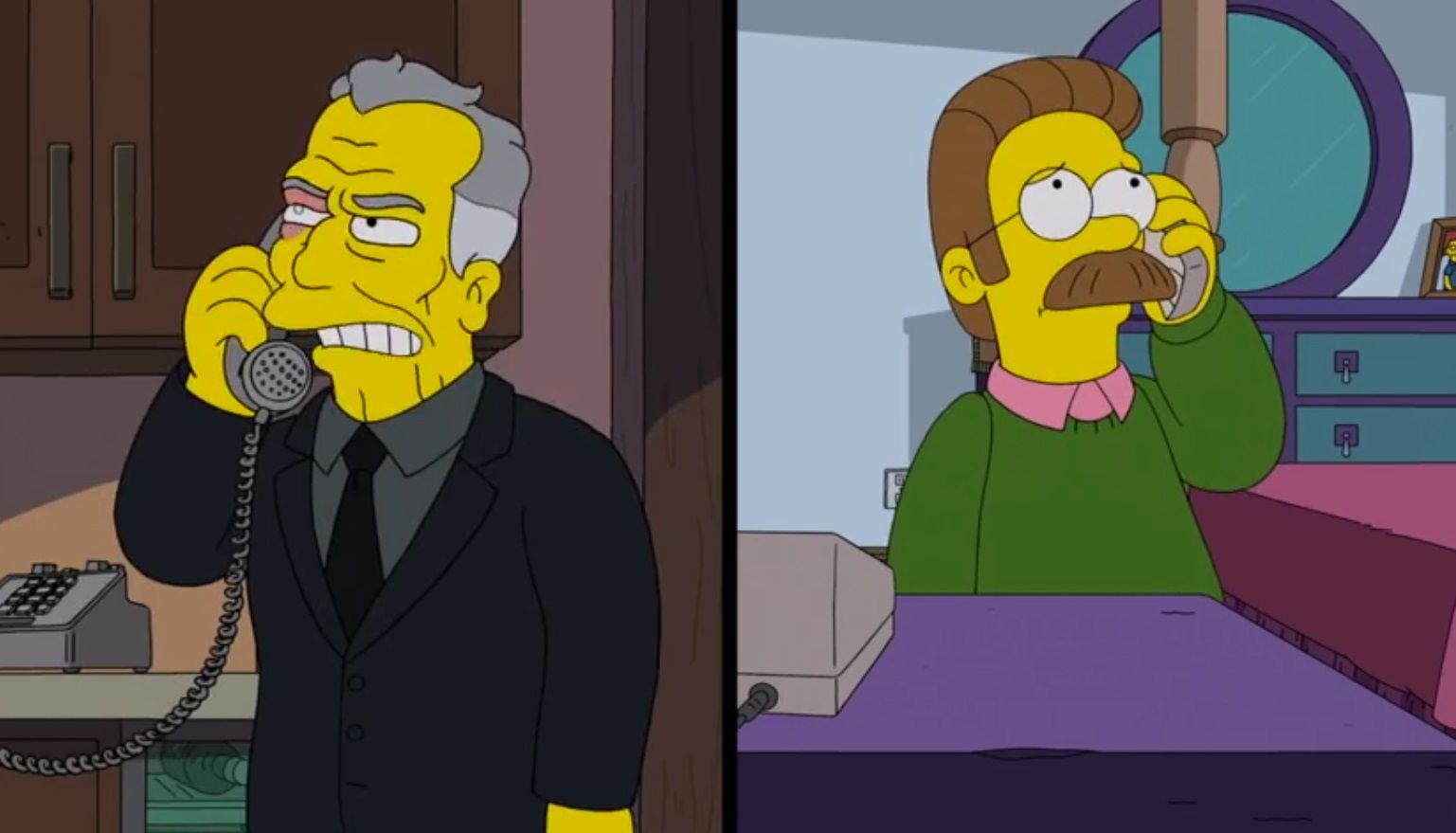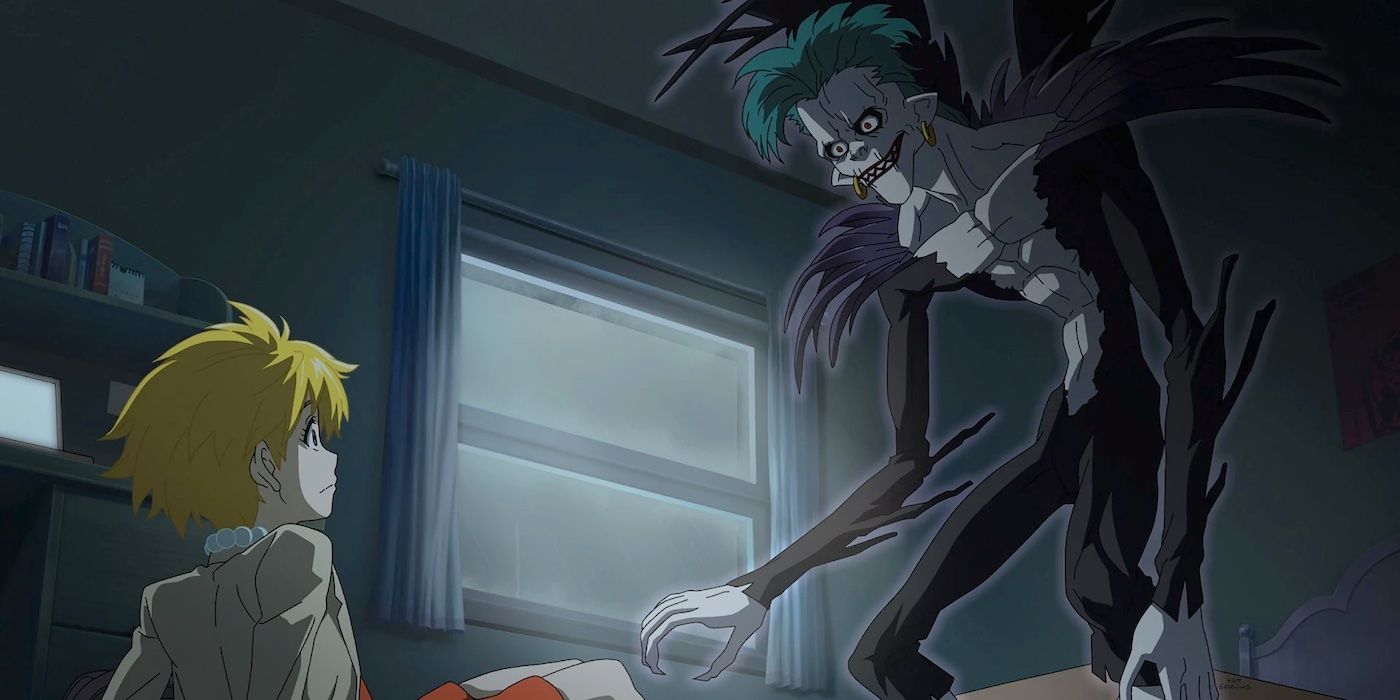The oft-repeated refrain is that The Simpsons' classic era ended sometime around Season 10, but recent seasons have challenged the validity of that cliché. While there have been standout, Emmy-worthy moments throughout the show's 30-year lifespan, Seasons 33 and 34 feel especially modern in terms of experimental storytelling and meta-commentary. These qualities have buttressed recent episodes from the pitfalls of the show's less-fondly-recalled eras, specifically those that used random weirdness as a deus ex machina or that felt family-friendly to the point of tepidness. Perhaps the burdensome demands of diehard Simpsons fans are best conveyed by the Focus Group Guy in "The Itchy & Scratchy & Poochie Show": "So you want a realistic, down-to-earth show... that's completely off the wall and swarming with magic robots." Simpsons fans pine for the era when showrunners Bill Oakley and Josh Weinstein seemed to effortlessly produce satiric greatness, but anyone attempting to replicate that duo's comedy gold knows how challenging a task it can be. Recapturing a bygone era may be impossible, but the past two seasons of The Simpsons have showcased the creative team's spectacular efforts to craft a modern version of the show that is still hilarious and compelling.
"A Serious Flanders (Parts 1 and 2)"
The highlight of the 33rd season was a two-part episode in which Christian neighborino Ned Flanders becomes the protagonist in a gritty prestige crime drama in the vein of Breaking Bad. The framing device is that someone is scrolling through a Netflix-esque streaming service in which all the shows are Simpsons-themed spin-offs, eventually landing on a show called "A Serious Flanders." Equal parts gripping and laugh-out-loud funny, the two-parter presents a scenario in which normally milquetoast Ned must bend his moral code to the point of breaking it completely. When Ned discovers a discarded Pan Am bag stuffed with cash, he donates the money to an orphanage. News gets out about his generosity, and a menacing, ledger-obsessed criminal, Kostas Becker (Brian Cox), emerges to reclaim the money and slaughter anyone who stands in his way. The result is a violent, high-stakes double-header where the viewer is never certain which characters will live or die. Though shocking, brutal consequences might seem like an odd fit for the residents of Springfield, both parts of "A Serious Flanders" ape the tropes of prestige dramas so skillfully that they simultaneously function as witty parody and electric storytelling.
Of the many stylistic elements lifted from Vince Gilligan and Matthew Weiner, "A Serious Flanders" especially nails the prestige drama stereotype of aesthetic cinematography with blasé subjects, i.e., beautiful shots of cars driving along a desert highway or a close-up of meticulously plated food. The Simpsons also pokes fun at the genre's propensity for montages set to enigmatic pop music; Chris O'Dowd's hitman Seamus criticizes his wife with the line, "How come every song you play has to be so kooky and obscure?" The episodes don't pull any punches when it comes to violence either, making for some of the most graphic cruelty in the show's history. Kostas Becker kills the recurring Rich Texan character, and his goons feed the man's face to Santa's Little Helper. The notion that any character could die gives weight to these episodes and makes them more exciting, even if they do take place in a non-canonical version of The Simpsons universe. (Though the rules of Simpsons continuity are so nebulous, who's to say what is and isn't canonical anymore?) When the hitmen mistake Homer for Ned due to Homer's countless "borrowed" belongings labeled "Property of Ned Flanders," Ned decides to lie and manipulate innocent people in order to save Homer's life.
Watching Ned struggle to justify his misdeeds is entertaining in a similar way to watching Walter White transform from schoolteacher to drug lord. At first Ned is mortified when he discovers that his new flame, orphanage director Barb Belfry (Cristin Milioti), is part of an open marriage with Sideshow Mel, but when he needs to reclaim the money he donated in order to save Homer, formerly pious Ned misleads and seduces Barb just so he can steal the cash. Following a character arc similar to those of a Coen Brothers protagonist, unassuming Ned becomes the key player in a series of bloody and unethical dealings, eventually having to seclude himself in a remote cabin à la Walter White or Dexter Morgan. He also learns that his beloved grandfather, Sheriff Flanders (Timothy Olyphant), whom he believed to be a perfectly virtuous role model, was actually a crooked cop that licked toads and jammed them into ashtrays like used cigars. Eventually merciless baddie Kostas finds Ned, leading to a confrontation where Ned must fight to survive. There is never any indication that the consequences of this story will have a lasting impact beyond the two-parter, but this exciting and creative mash-up of comedy and drama proves resolutely that The Simpsons still has the potential to shock and impress its viewers.
"Lisa the Boy Scout"
What begins as an average episode quickly veers off the rails when a hacktivist group reminiscent of Mr. Robot interrupts the broadcast and threatens to devalue The Simpsons as intellectual property by releasing shockingly terrible clips that Disney (yes, they own The Simpsons now) does not want anyone to see. What follows is a pseudo-clip show of outlandish premises and bizarre situations, a meta version of Season 7's classic, "22 Short Films About Springfield." The premise allows the writers to present a cavalcade of rapid-fire insanity, including the revelation that Lenny was a figment of Carl's imagination and that Martin Prince is actually an adult undercover cop with a wife and children. As the episode continues, the hacker characters played by Anna Faris and Hank Azaria start a hilarious budding romance, one that helps them cope with the fact that no one seems to care enough about The Simpsons to pay the ransom money.
Though animated comedies like Family Guy and South Park so consistently push boundaries and get away with shocking content that it often feels like The Simpsons is plush and cuddly by comparison, one particular segment in "Lisa the Boy Scout" goes right up to the line of decency, enough so to deserve a few bravos. In "The Seduction of Seymour Skinner," the viewer learns that Seymour is seemingly having a romantic affair with an elderly woman he refers to as "Mother." They meet in a sleazy hotel, and Seymour wears a disguise to hide his identity. The risqué atmosphere is heightened further by Seymour's jaw-dropping line, "Oh, Mommy. I can't wait another second. You know I need it." This is turned on its head by the montage that follows, as sexy saxophone music accompanies shots that seem romantic but quickly turn familial. The fake Mother uses smoldering candles to heat up a grilled cheese for Seymour. A pan over Seymour's hastily strewn clothes on the hotel room floor tilts up to reveal Seymour is in a childlike onesie, kicking his heels up while watching cartoons. A shot of the bedposts rhythmically banging against the wall pulls back to show that the shaking is due to Seymour sawing a piece of wood that he subsequently uses to construct a birdhouse for his "Mother." The whole thing is very silly, but the fact that it inches so close to depravity makes the sequence hysterical.
The coup de grâce of this episode comes when the writers actively acknowledge some of The Simpsons' most notable missteps over the years. The hackers decide to share the show's absolute worst content, cueing a sequence of the show's actual misfires. Moments in this montage include Homer taking a sensual shower with a rack of gyro meat, Mr. Burns playing happily with his own dangling eyeballs, and the Halloween segment in which Homer cuts off his own body parts and eats them. Also prominently featured is a moment that many fans regard as the show's "jump the shark" moment, a scene from Season 11's "Saddlesore Galactica" where a gang of jockeys reveal themselves to be gnomes. Ironically this laundry list of regrettable moments is so funny that it serves as proof that the show is experiencing something of a renaissance in comparison.
"Treehouse of Horror XXXIII"
Halloween episodes of The Simpsons have long been fan favorites, and the most recent iteration ranks among the best. Beginning with a genuinely creepy parody of The Babadook in which Marge relentlessly tries to kill Maggie, the episode truly kicks into gear during its second segment, a picture-perfect parody of anime series Death Note animated by DR Movie, part of the team responsible for creating the original Death Note. Seeing Simpsons characters redesigned in anime style is surprisingly compelling; the show's comedy works well in this style, and the character redesigns are extremely charismatic. Marge's blue bouffant is reimagined as a more practical updo. Homer is still a lovable oaf, but now he's a sake-swilling salaryman. Springfield is stylized like Tokyo in this incarnation, with classic businesses like Krusty Burger and The Android's Dungeon given billboards and storefronts befitting a busy cityscape.
There are plenty of great gags in every frame, like ads for Disposable Cars and Gender Reveal Napalm. As Lisa uses the so-called "Death Tome" to murder the unsuspecting businesspeople responsible for climate change, she begins to run out of ideas for how to kill people. (Her shinigami god of death, Steve Johnson, informs her that each kill must be unique.) The result is Lisa reusing certain modes of death with minor variations. One person is killed by a toilet alligator, and then another is killed by a toilet lion. Lisa's plans are foiled when Bart, modeled after the iconic and idiosyncratic Death Note character L, discovers that Lisa is responsible for the murders. The only problem with this fantastic segment is that it is too short! Between this anime style and "A Serious Flanders," it is clear that The Simpsons is just as enjoyable when it embraces other formats. It is exciting to consider where the series might take this train of thought next.
As in "Lisa the Boy Scout," the third segment of "Treehouse of Horror XXXIII" is a treasure trove of meta-commentary. In a parody of Westworld, Homer discovers that he is a robot in a theme park where fans recreate classic Simpsons moments. When robot Homer frees Lisa by giving her self-awareness, she exclaims, "We're replicants in a ridiculous theme park for an ancient TV show that stopped being good after Season 45." As with the other episodes in this article, Treehouse of Horror XXXIII proves that The Simpsons still delivers palpable laughs and genuine surprises, which is even more incredible considering the show has been a staple of TV comedy for 34 years. The careful blend of experimental storytelling and meta-commentary have produced something truly special, and it may be time for fans who have written off the series to give it another look.






